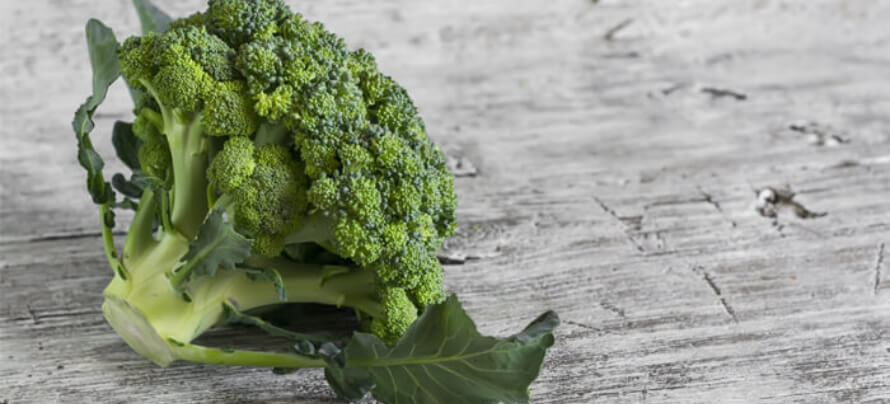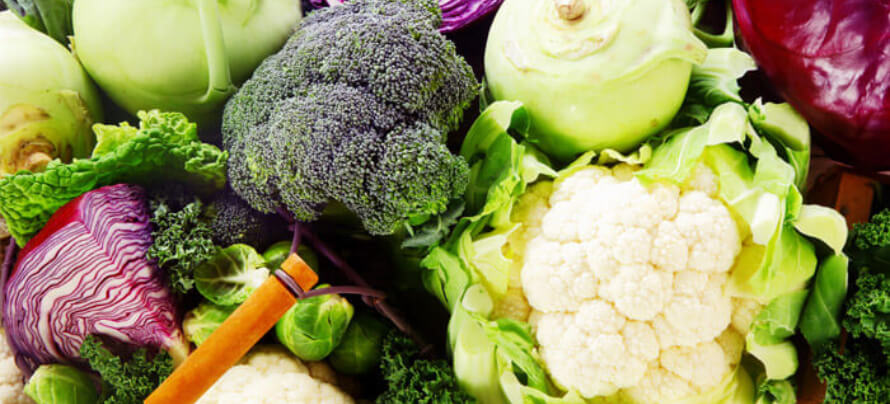Key Takeaways
- Sulforaphane is a molecule in cruciferous vegetables, mostly broccoli sprouts, that is said to have wide ranging protective effects in the body.
- Sulforaphane does have a potent antioxidant effect. While it’s not a panacea, it may very well be a legitimate anti-cancer supplement that helps preserve health.
- Sulforaphane can be taken either as a supplement, or with a handful of broccoli sprouts, and both choices are likely to lead to a healthier life.
While many supplemental herbs have benefits to health, there are problems when it comes to supplementing the herbs themselves.
I’ve written about this before, but the general idea is that a herb is in and of itself “nature’s proprietary blend.” It’s the molecules in the herb doing the benefits (and harms) so we need to identify and, at times, isolate them to learn more.
This is the case of sulforaphane, one of many beneficial compounds in broccoli that has been isolated and now has its own body of evidence.
Honestly, it’s a pretty cool compound. Activates a very basic, yet powerful, chain of antioxidant responses in the body. There’s just, well, a few issues:
- Cruciferous vegetables have a lot of cool compounds, not just sulforaphane, and a lot of claims associated with those compounds are being confused with sulforaphane on the basis of “lol, broccoli.”
- Even if it’s a great antioxidant, antioxidation isn’t everything.
This leaves sulforaphane in a weird place where it’s a cool molecule, not hyped up too much in the mainstream, and yet every now and then you come across an acolyte of Rhonda Patrick’s praying the cancer away at a shrine to sulforaphane.
Yup, apparently “passionate and honest researcher” plus “Joe Rogan Experience” equals “fervent religious following.”
Clearly sulforaphane isn’t a panacea, nothing is, but given how I have a tendency to make absolutely idiotic introductions and yet I’ve done this one pragmatically sort of suggests I take this molecule seriously. I do, it ain’t no spirulina but it’s a good molecule.
So what makes it special? Is sulforaphane near the top of ideal antioxidants? Read on.
Table of Contents
+
What Is Sulforaphane?

Sulforaphane is one of the “isothiocyanate” molecules found in broccoli.
Isothiocyanate refers to a group of similarly structured molecules that are found in cruciferous vegetables like cauliflower, brussels sprouts, and cabbage—they are commonly implicated in the unique health benefits of these plants.
A few of them have been identified and used in supplements before, most notably diindolylmethane (DIM), indole-3-carbinol (I3C), and phenethyl isothiocyanate (PEITC.)
These molecules are found both in their “active” forms, as listed above, but also storage forms where they’re bound to sugars. These storage forms are called glucosides and include:
- Glucobrassicin, which provides I3C (and later turns into DIM)
- Gluconasturtiin, which provides PEITC
- Glucoraphanin, which provides raphanin and sulforaphane
There are many more molecules in the isothiocyanate group that are less popular or potent, and thus we won’t get into them in this article, but the general idea of this group is that they have a specific chemical group in them.
It is written as R-N=C=S.
To people not well versed in chemistry it can be read as “hot damn, that sulfur group is gonna be shooting right off that puppy when the conditions are right.”
Sulfur is actually a pretty cool element when it comes to human nutrition, and is a major player in the benefits of garlic. It’s connected to antioxidation through the enzyme glutathione, blood flow through creating hydrogen sulfide, and is being investigated for anti-cancer effects.
It’s thought that the isothiocyanate group allows the anti-cancer effects of sulfur to be more relevant to humans eating it, rather than injecting it straight into a cell. Most isothiocyanates are researched for this purpose and sulforaphane has gained a lot of popularity in recent years due to its unique mechanisms.
And that mechanism is what’s known as HDAC inhibition.
What Does Sulforaphane Do?
Sulforaphane works primarily through HDAC inhibition.
HDAC is the acronym for Histone DeACetylase, a group of enzymes that interact with DNA and how it can bind around what are known as “histones”—effectively proteins that help make DNA more compact and store it.
DNA can’t really do its job if its wound around a histone, needs to be unravelled first. The process of acetylation (moving acetyl- groups around) is one of the ways DNA can be unravelled and raveled up and it’s where the HDACs come into play.
Y’know, histone deacetylase. It interacts with histones, and acetylation—thank God biology decided to take the basic naming route on most of these things.
So, where does sulforaphane play into all of this?
Sulforaphane can inhibit some HDAC enzymes and, as a result of said inhibition, increase the activity of a pathway known as the Keap1-Nrf2 pathway (by increasing Nrf2 activity.)
This overall pathway has numerous functions in a cell but, generally speaking, those functions are grouped together by the roles of detoxification, antioxidant protection, and cellular survival.
In summation, sulforaphane increases the activity of an entire genetic signalling pathway whose main function in the body is to protect against cancer formation, toxins, and excessive oxidation.
The Top 3 Sulforaphane Benefits

We can be here all day if we just delve into genetic pedantry, so how about we look at the most relevant human and animal data? Rather than delving into minutia, any good data on what we can expect when we plop some sulforaphane into our mouths?
1. Sulforaphane and Cancer
Surprisingly, sulforaphane does not seem to have really good direct and clear evidence to show it reduces cancer rates.
The evidence we have is a bit scattered, data points that are hard to directly connect to one another, but all generally suggest that there are some protective effects.
When it comes to rodent evidence, numerous studies show that rats with cancer tend to see benefits with sulforaphane either alone or when paired with a chemotherapeutic (a cancer killing drug).
Now, naturally we cannot give people cancer to get conclusive proof as to whether or not sulforaphane prevents it but we can give cancer to rodents—and in the same study show that what sulforaphane did in the rodents, it did in human volunteers.
Paired with evidence that 200 micrograms of sulforaphane slightly reduces biomarkers of both prostate cancer and breast cancer, sulforaphane seems promising for a “small step forward” in cancer protection. However, the potency seems rather low based on limited human studies.
Right now it doesn’t seem disingenuous to call sulforaphane an anti-cancer molecule, which is higher praise than it sounds like since the majority of supplement claims are bogus. Just understand that it isn’t going to be as potent as legit anti-cancer drugs.
2. Sulforaphane and Oxidation
The link between sulforaphane and oxidation lays in Nrf2.
When Nrf2 increases in activity, it causes a chain of events that can widely be described as “anti-inflammatory and antioxidant.” Rather than being something direct, like vitamin C that literally grabs oxidants, sulforaphane works through antioxidant enzymes.
A major one of these is glutathione, which naturally becomes more active when Nrf2 becomes more active.
It’s not the rarest thing for dietary supplements to do. Baicalein (from skullcap), shisandrin B (from schisandra), pelargonidin (from strawberries), and quercetin (from, um, pretty much everything) all increase glutathione via Nrf2.
However, that’s in vitro preliminary evidence. Sulforaphane has evidence in humans to show that it can increase antioxidant capacity in this manner in brain tissue. The protective effect has also been demonstrated, in humans, to affect the lungs, airway, and liver.
Relative to other options for increasing antioxidant enzymes, sulforaphane seems to have more relevant human evidence and seems to be able to go to the target tissue on an as needed basis. A good, practical, choice for an antioxidant supplement.
3. Sulforaphane and Autism
Oh boy, time to open this can of worms.
Sulforaphane has, at least in one study involving the John Hopkins University School of Medicine and Harvard Medical School, noted that in young men (aged 13 to 27) with moderate to severe autistic symptoms their symptoms of autism seemed to be lessened.
Fifty to one-hundred and fifty micromoles of sulforaphane given to the men over 18 weeks caused improvements in social behaviour and communication—all these changes were reverted when sulforaphane usage was stopped.
The reasoning for using sulforaphane in this study was in part due to how autism seems to be a state with higher than normal levels of oxidative stress in the brain, a bit more inflammation in the brain than usual, and how sulforaphane is safe enough to test.
It was later shown that, yes, sulforaphane does indeed improve antioxidant levels in the brain (via the enzyme glutathione) suggesting a possible reason for the observed effects.
Currently, while evidence is limited sulforaphane may actually be a viable supplement for improving social and communication side-effects of autism spectrum disorder.
What Does Sulforaphane Not Do?
Sulforaphane got quite a bit of hype among researchers before, and the resulting avalanche of studies conducted caused it to get some quality proof of what sulforaphane doesn’t do. Always nice to know what good molecules don’t do so we don’t make false panaceas.
The four things that sulforaphane does not do are:
- Doesn’t seem to inherently improve cognition.
- Doesn’t seem to be a practical antioxidant for lung problems.
- May not be a viable hair loss prevention supplement.
- May not be at all relevant to weight loss.
Let’s look at both of these in more detail.
1. Sulforaphane and Cognition

This may be a contentious place to put sulforaphane, but there are two reasons as to why I’m suggesting that it does not “increase cognition.”
First, let’s define cognition. Cognition is an overarching term referring to the actions and processes our brain takes that help us acquire knowledge and understanding about the world.
Greater and more flexible cognition doesn’t inherently mean more intelligence, and if we are to use a computer analogy cognition is the sum of all parts whereas IQ is simply the processing speed, but better cognition allows you to gain intelligence faster and more effectively.
So if we can improve cognition, we should, and we should also try to prevent any unnecessary hindrances to our cognitive processes.
With that out of the way, there is no human evidence at this point in time and, secondly, the available evidence we have does not suggest an inherent brain-boosting effect like bacopa but rather only a protective one—if there’s an oxidative insult to your brain, sulforaphane can protect you, but that’s it.
Rodent studies have shown us that inflammatory insults, like LPS, models of Alzheimer’s, diabetes, toxic metals, and other various compounds that normally decrease memory and cognition are partially prevented by sulforaphane.
This seems to be related to the Nrf2 stuff and improvement of antioxidant defenses and, while it can be enough to suggest sulforaphane is a brain “health” or “protective” supplement it isn’t enough to call it a brain booster—yet.
Ultimately, if you want to claim that sulforaphane can protect the brain from damage it does seem to be a legitimate claim. However, calling it a cognitive enhancer at this moment in time seems a bit disingenuous.
2. Sulforaphane and Lung Health
Sulforaphane has a surprising amount of evidence in regards to the lungs, and whether or not it can be a “lung healthy” supplement.
As mentioned previously, sulforaphane is able to improve antioxidant defenses in the airway and was able to protect the airway from smoke-induced inflammation (in vitro study, mind you.)
This isn’t the most common area for a dietary supplement to affect and, ultimately, the supplement can only help the tissue if it can get there in the first place.
So, since sulforaphane could get to these areas and shows some protective properties on airway cells it was investigated as to whether or not it was strong enough to help these areas in humans.
Unfortunately, a pair of studies assessing broccoli sprouts and sulforaphane alone both failed to find a significant reduction of airway inflammation and in a study on chronic obstructive pulmonary disease (COPD) also failed to find benefit with sulforaphane.
According to current evidence on the topic, sulforaphane does not seem potent enough to cause appreciable benefits to the health of the lungs. However, it does at least get to the tissue and try to cause protective effects there and may be relevant in the future.
3. Sulforaphane and Hair Loss

Sulforaphane has been associated with preventing hair loss since, honestly, anything that even has a single study on this topic is beaten into submission by men afraid of father time.
Sulforaphane’s one study comes from Tokyo, where it was found that sulforaphane injections into mice were able to improve hair regeneration by breaking down DHT—the most powerful androgen that is associated with male pattern baldness.
However, this 10 mg/kg injection also reduced testosterone in the mice—human studies using more moderate sulforaphane doses do NOT see any changes in testosterone level compared to placebo.
So while it may be possible that high concentration, and topical, usage of sulforaphane has some anti-androgenic properties this is something not conclusively proven and also doesn’t seem to apply to oral supplementation of sulforaphane—most likely not relevant to most users.
4. Sulforaphane and Weight Loss
Of course, the plant-based compounds are claimed to make you lose fat.
You can technically find studies that connect sulforaphane with adipose tissue (body fat), but the studies are mostly cellular studies that note “healthy” compounds like sulforaphane can normalize some downsides of metabolic syndrome—reduce glucose intolerance, improve leptin signaling, that sort of thing.
The only real evidence on this topic comes from a study where 30 grams of broccoli sprouts were compared to control to see if there was any effects of the sprouts— a reduction in inflammation was seen but body weight remained the same over 10 weeks.
So ultimately, no, sulforaphane does not have convincing evidence to support the idea that it can reduce body weight or fat mass.
What Is the Clinically Effective Sulforaphane Dosage?
At this moment in time, studies that use sulforaphane in humans tend to use approximately 200 micrograms of sulforaphane.
However, many rodent studies use 0.1 to 0.5 mg/kg body weight that, after translating it to a human dose, correlates to a higher dosage range of approximately 10-60 milligrams.
For all intents and purposes, aim for at least 200 micrograms of sulforaphane but know that there is no harm in overshooting it even by a large margin.
If you simply want to eat broccoli sprouts about 20-30 grams of them (fresh weight, not concentrated in any way) is more than enough to have beneficial effects.
What Are the Most Common Sulforaphane Side Effects
At this moment in time there have not been any major side effects reported with supplementation of sulforaphane in humans, or with consumption of broccoli sprouts as a source of sulforaphane.
However, while uncommon it is not unheard of for people to be allergic to cruciferous vegetables including broccoli. This allergy will also apply to any supplement that has a name similar to “broccoli extract” or “cauliflower extract” (since it is essentially dehydrated vegetable) and impure sulforaphane supplements may also carry a risk.
Should You Take Sulforaphane Supplements?
Generally speaking, yes. If you want to to get the benefits of sulforaphane a supplement would be prudent.
A sulforaphane extract supplement may be better than isolated sulforaphane as well, as it seems that the absorption of sulforaphane (even from broccoli sprouts themselves) is enhanced with a healthy dose of glucoraphanin—another isothiocyanate.
One of the rare instances where a more crude supplement, something like “broccoli sprout extract,” may be better than the isolated molecule.
What Foods Are High in Sulforaphane?

The isothiocyanate family of molecules are found in cruciferous vegetables. Botanically speaking, cruciferous refers to any plant in the Brassicaceae family (it used to be the Cruciferae family, and the terms are sometimes synonymous.)
Some of the foods that are highest in sulforaphane include . . .
- Broccoli
- Cauliflower
- Brussels sprout
- Radish
- Horseradish
- Cabbage
- Arugula
- Watercress
- Mustard
- Collards
Of course, each specific plant has different ratios of isothiocyanates to one another. Some are high in PEITC, others in I3C, and some high in isothiocyanates that I can’t even name cause they’re so boring.
When it comes to sulforaphane, it tends to be in higher levels in broccoli but also has a relation to the age of the plant—being reduced as the plant grows since it converts into other isothiocyanates. This means that the sproutlings of broccoli are highest in sulforaphane.
When it comes to actually choosing a food to get the benefits of sulforaphane studies have only attempted to use broccoli sprouts. It isn’t really known whether or not eating the other cruciferous vegetables can give you enough for the benefits listed in this article.
For broccoli sprouts, however, about a hand full of them (unclenched, let it overflow a bit) should be fine.
The Bottom Line on Sulforaphane
Sulforaphane is a widespread, quite safe, potent antioxidant that has the potential to help most functions of the body.
Unfortunately, most problems don’t go away by simply throwing antioxidants at them. Despite sulforaphane’s widespread reach and relative potency it doesn’t seem to have strong effects outright—just a nice push in the right direction, sometimes.
This benefit seems to be relevant when you want to reduce your risk of cancer, and diseases that are worsened by oxidation may see some benefit—most notably autism.
However, protective effects are not inherent as we can see with sulforaphane protecting the brain (and not otherwise increasing cognition outright) and sometimes too weak to be practical like how sulforaphane fails to provide reasonable benefits to lung health.
Sulforaphane is a great example of a molecule that may be too expensive to buy on it’s own, but if it’s slipped into another product you’re taking (a multivitamin or a greens supplement) on the cheap it can make the product much better.
Even more important, you don’t need supplements for sulforaphane. Broccoli sprouts are an entirely feasible way to “enjoy” your sulforaphane, if you can get past the taste.









